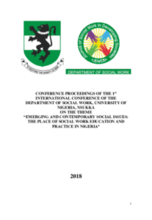Displaying 211 - 220 of 505
In this exploratory study, through use of an online anonymous survey, local county child welfare caseworkers were asked to self-rate their knowledge of, exposure to, and comfort levels with children with developmental disabilities.
Communication skills are fundamental to social work, yet few studies have directly evaluated their impact. This study explores the relationship between skills and outcomes in 127 families.
This study examined the relationship of caseworker ratings of risk across multiple domains to youth functioning and service use for a sample of children open to the child welfare system.
This articles presents an analysis of 33 semi-structured interviews with foster families in Flanders, exploring the tensions between voluntaristic and professionalising tendencies in foster care.
Indigenous children have a long history of overrepresentation in child protection systems. This exploratory, mixed methods study examined practitioner perceptions of risk in response to client ethnic group.
This study presents the feasibility and pilot evaluation of the Reflective Fostering Programme (RFP), a recently developed, group-based program to support foster carers, based on the concept of “reflective parenting.”
The aims of this investigation were to (a) examine the effectiveness of the KEEP intervention at reducing behavior problems among children in foster care, as assessed by the Child Behavior Checklist (CBCL), during implementation of the intervention by a community agency using a randomized design and (b) determine whether the intervention is effective at reducing internalizing forms of behavior problems.
This article presents the results of a systematic mapping of social work training programs in countries throughout West Africa, a region historically under‐represented in global discussions of the social welfare workforce.
The First International Conference of the Department of Social Work, University of Nigeria, Nsukka, with the theme “Emerging and Contemporary Social Issues: The place of Social Work Education and Practice in Nigeria” was held 10-13 September 2018 and included 96 oral presentations of papers by delegates from across the country. Several papers focused on illegal adoptions of children in Nigeria and the role of social workers in addressing this practice.
This study examined the impact of the model of professional childcare in a three-year project involving fifty-three children and young people and their carers in local-authority children’s homes on two UK areas (Northern and Southern England).

